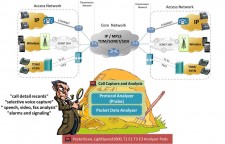
Gaithersburg, Maryland, April 4, 2018 (Newswire.com) - GL Communications Inc., announced today its latest software solution with applications to Lawful Interception, Data Retention, Fraud Detection, and Voice Quality and more.
Speaking to the press, Mr.Jagdish Vadalia, a Senior Manager for Product Development of the company said, “When "problem calls" occur infrequently but often enough, they can negatively affect profit, productivity and efficiency. However, to analyze "why or how such a problem occurred" when massive call volumes are involved, operators are presented with the difficulty of finding a needle in a haystack.”
GL's Signaling and Traffic Analysis software and hardware have been widely used by network operators and carriers to troubleshoot poor call quality problems, or as modules or tools in "larger lawful intercept" solutions, to detect fraudulent calls, for traffic engineering, for call analysis, and for billing. These tools can detect, classify and selectively capture "calls-of-interest" from massive volume of calls.
Mr.Shelley Sharma, Chief Marketing Officer
He added, “Generally, methods deployed to perform fraud detection, is to use monitoring tools non-intrusively. Lawful interception systems for IP and TDM may be used or conventional tools to capture unknown or abnormal calls based on the calling activity. Capture, monitoring, and filtering tools can help to identify and to drill-down the “calls-of-interest” or “fraudulent calls”.”
Mr. Vadalia further explained, “Protocol Analyzers (Probes) and Packet Data Analyzers (PDAs) which provide CDR Analysis are the core components of GL’s Signaling and Traffic Analysis test suite.
Protocol Analysis probes are deployed in the network to non-intrusively monitor and capture the bi-directional calls on the network. These probes are available for all networks – IP, Wireless, Optical, TDM, and PSTN, and depending on the underlying network, suitable Analyzer platform may be used.
PDAs work with probes to generate CDRs, record voice/video/fax/tones/digits on the established calls and perform analysis on captured data quality. PDA processes the captured packets/frames, identifies, and segregates calls based on signaling and traffic parameters. Sophisticated filters permit zooming and recording of specific calls of interest. All or filtered traffic can be recorded into a trace file.”
He further added, “Users can listen or record audio and data of a VoIP session calls in real-time. And can also perform speech-level analysis, fax analysis, video analysis, power, frequency, spectral, tone and digit analysis with ease and precision. The process helps users to get an exact picture of Quality of Service (QOS) and the technical adherence of the system under test (adherence to the protocols specified by the standardizing authority).
Signaling and Traffic Analysis software and hardware have been widely used by network operators and carriers to troubleshoot poor call quality problems, or as modules or tools in “larger lawful intercept” solutions, to detect fraudulent calls, for traffic engineering, for call analysis, and for billing. These tools can detect, classify and selectively capture “calls-of-interest” from massive volume of calls.”
Important Features
•Scalable architecture allows up to STM-4 rate per server and multiple servers can be stacked to increase call capturing capacity to 10's of thousands of calls
•Signaling decode information on each call, including ladder diagrams
•Detect call types (voice, sms, fax, video, …)
•Store CDRs in database/ CSV file formats
•Automatically record voice traffic for all calls or filtered calls
•Continuous unlimited recording, limited only by hard disk or network storage space
•Capture/playback audio – listen and record audio streams
•Ability to store voice in PCM or WAV formats
•Drill-down to problem calls using filters for post analysis
•Analyze and identify customer calling patterns
•Capture for extended periods of time from hours to months
•Search for "calls of interest" while live capturing continues
•Filter calls based on called number, calling number, or type of call
•Monitor daily operations thru call statistics
•Monitor usage of trunks on a daily or weekly basis
•Provide insight into overall performance
Applications
•Post Call Analysis for Call Quality, Called / Calling Numbers, Mid Call Digits
•Calls of Interest, Fax Calls, SMS Calls, Selective Calls
•Traffic Engineering
•Voice Quality Analysis
About GL Communications Inc.,
GL Communications Inc, is a global provider of test and measurement solutions and has over the years worked with major telecom equipment vendors, service providers, and system integrators to meet the testing requirements arising at various stages of telecom products development life cycle.
GL offers a broad set of test solutions that help perform all types of testing on networks, from initial system design, to fine-tuning, troubleshooting, live deployment, and monitoring. The products are widely used to verify and ensure 'quality and reliability' of Wireless (4G LTE, 3G, 2G), SONET/SDH, IP, TDM, and PSTN networks.
GL core product development is backed by a strong team of R&D experts to match evolving market and technical challenges in a most cost-effective and innovative way.
Contact:
Shelley Sharma
Phone: 301-670-4784
E-mail: info at gl.com
Source: GL Communications Inc
Share: